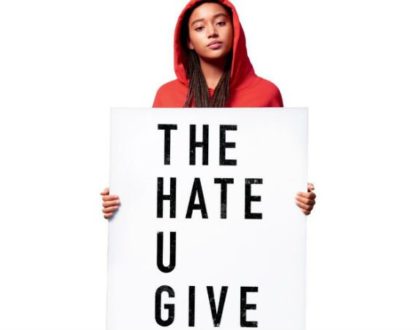The Hate U Give Shines: A Movie Review

The Hate U Give (2018) opens with a family around their dining table. Starr, played by Amandla Stenberg, tells the audience, “I was nine years old the first time I got the talk.” When her father (Russell Hornsby) explains to elementary school age Starr and her brother Seven (Lamar Johnson) to always put your hands on the dashboard when you are pulled over by a cop, it becomes clear that “the talk” is about how Black Americans must act when interacting with law enforcement to try to avoid being killed. It is clear through Starr’s voiceover and her father’s tone that this talk is a crucial coming-of-age conversation for their family and for all Black Americans. In this opening scene, we see not just the ever-presence of police brutality in the lives of Starr’s family members, but also the strength and connection within the five-person household. These two themes support this groundbreaking, heart-shattering blockbuster, directed by George Tillman Jr.
Twenty minutes into the film, Starr, now a high school junior, is riding in a car with her lifelong friend Khalil when a cop pulls them over and fatally shoots Khalil. The film follows Starr and her surrounding communities as she recovers from bearing witness to Khalil’s murder and as she navigates how to bring about justice for this crime. Starr lives in Garden Heights, a predominantly Black and low-income neighborhood, and goes to school across town at Williamson Prep, which is largely white and wealthy. Before Khalil’s death, Starr speaks about code-switching between these spaces, and how she doesn’t feel fully herself in Garden Heights or at Williamson Prep. In the wake of Khalil’s murder, her tension increases as she navigates reactions and responses from her and Khalil’s families, her school friends, a local gang lord, the media, and more.
The film largely stays true to Angie Thomas’s 2017 novel of the same name. Billed as a young adult novel, both the book and its adaptation are strong Black Lives Matter beacons for people of all ages. Only a few lesser storylines are cut through the adaptation, and Thomas’s strong characters and sense of community are strong backbones for the movie. The joy Starr’s family experiences together radiates on the screen. The morning after Khalil’s death, Starr wakes up to her father sitting next to her bed ready for whatever she needs, and when her younger brother Sekani steals her bacon, the whole family erupts in laughter. The Carters experience violence from police and gang members, and as a counterbalance, the film depicts one of the strongest families on film.
Amandla Stenberg and Russell Hornsby shine as the two brightest performances among a brilliant cast. Amandla flawlessly captures Starr’s navigation of her communities and her road to finding her voice. Amandla has been through a similar journey. After first attracting attention for their role as Rue in The Hunger Games, they received both praise for their performance as well as bigotry from those who refused to accept Rue’s Blackness. From there, Amandla has been a vocal intersectional feminist, speaking up about gender identity, the commodification of Black hair, and movie roles for Black girls.
Amandla saw The Hate U Give as not just an opportunity to tell a story, but as a political and educational campaign. They recently spoke with Trevor Noah on The Daily Show, who mentioned that he saw people crying in the theater. Amandla, laughing, stated that “White people crying was actually the goal!” They went on to say that, “We wanted to make sure that those who have been affected by the ways the media misconstrues these events actually have a real sense of empathy and are able to place themselves into the shoes of our communities.” The film roots itself in one girls’ narrative, through which it explores themes such as police brutality and code-switching that all Black Americans face. As Collider pointed out, just like there is no universal ‘white narrative’, the film “doesn’t attempt to encapsulate the ‘black experience’ in one individual, or even one family. Instead, in telling the coming-of-age story of a young black teenager The Hate U Give offers a diverse view of what it’s like to grow up black in America.”
The title for the book and film, The Hate U Give, draws from Tupac’s T.H.U.G. L.I.F.E message which stands for “The Hate U Give Little Infants F***s Everybody.” Starr learns about Tupac’s acronym from Khalil just minutes before he is murdered. It serves as Starr’s basis for understanding that racism is embedded into American institutions. She witnesses the effect of police racism on young Black boys such as her brother. She speaks about how men from her neighborhood turn to drugs and gang activity after not being able to obtain jobs. She participates in protests that escalate when police create barricades and throw tear gas. She knows that the racism deeply rooted in American systems devastates all Americans. With this understanding, Starr learns that speaking up about Khalil’s murder is about “more than just Khalil. It is about black people, poor people, everybody at the bottom.”
With a beautifully realized world surrounding our protagonist Starr, George Tillman Jr. and the entire cast and crew breathe life into Angie Thomas’s phenomenal book. Don’t miss The Hate U Give, now playing across Boston.
